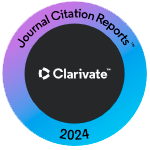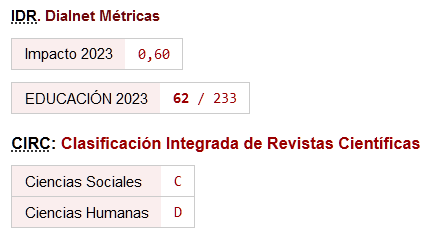Una evaluación de la escala sobre el miedo a la COVID-19 en docentes filipinos profesionales.
DOI:
https://doi.org/10.46661/ijeri.6181Palabras clave:
Miedo, profesores, desarrollo de escalas, covid-19, FilipinasResumen
La crisis mundial de la enfermedad del coronavirus 2019 (COVID-19) ha inducido enormemente impactos psicológicos en los humanos como el miedo. Teniendo en cuenta esta preocupación particular, existe la necesidad de probar los instrumentos utilizados para medir dicho impacto psicológico. Este estudio tuvo como objetivo evaluar las propiedades psicométricas de la Escala Miedo a COVID-19 (FCV-19) desarrollada originalmente por Ahorsu et al. (2020). Se seleccionó una muestra de 1.060 profesores profesionales de K a 12 de Mindanao, Filipinas, para participar en la encuesta en línea. El análisis preliminar mostró un alto nivel de miedo percibido a COVID-19 en los encuestados de este estudio. Los resultados de la serie de pruebas son alentadores ya que la Escala FCV-19 generó una validez de constructo robusta para modelos de estructura de uno y dos factores y una consistencia interna muy alta complementada por fuertes correlaciones entre ítems y correlaciones ítem-total. Los resultados respaldaron aún más la validez concurrente de la escala FCV-19 con características seleccionadas relacionadas con COVID-19 que predicen significativamente el miedo al COVID-19. En general, este artículo proporciona una evaluación del miedo al COVID-19 en una muestra de profesores profesionales y las propiedades de la Escala FCV-19 en un contexto particular. La escala FCV-19, una escala de siete ítems, es una medida válida y confiable que puede usarse para evaluar el miedo al COVID-19 de los maestros filipinos.
Descargas
Citas
Ahorsu, D.K., Lin, C.Y., Imani, V., Saffari, M., Griffiths M. D., & Pakpour, A. H., (2020). The Fear of COVID-19 Scale: Development and Initial Validation. International Journal of Mental Health Addiction, 1-9. https://doi.org/10.1007/s11469-020-00270-8
Alyami, M., Henning, M., Krägeloh, C. U., & Alyami, H. (2020). Psychometric Evaluation of the Arabic Version of the Fear of COVID-19 Scale. International Journal of Mental Health and Addiction, 1-14. https://doi.org/10.1007/s11469-020-00316-x
American Psychological Association. (2020). Psychological impact of COVID-19. Retrieved from https://www.apa.org/topics/covid-19/psychological-impact
Arora, A., Jha, A. K., Alat, P., & Das, S. S. (2020). Understanding Coronaphobia. Asian Journal of Psychiatry, 54, 102384. https://doi.org/10.1016/j.ajp.2020.102384
Aylie N. S., Mekonen M. A., & Mekuria R. M. (2020). The Psychological Impacts of COVID-19 Pandemic Among University Students in Bench-Sheko Zone, South-west Ethiopia: A Community-based Cross-sectional Study. Psychology Research and Behavior Management, 13, 813-821. https://doi.org/10.2147/PRBM.S275593
Barrios, I., Ríos-González, C., O’Higgins, M., González, I., García, O., Díaz, N. R., Torales, J. (2020). Psychometric properties of the Spanish version of the Fear of COVID-19 Scale (FCV-19S). Irish Journal of Psychological Medicine, 1-6. https://doi.org/10.1017/ipm.2021.5
Brooks, S. K., Webster., R. K., Smith L., Woodland, L., Wessely, S., Greenberg, L., & Rubin, G. J., (2020). The psychological impact of quarantine and how to reduce it: rapid review of the evidence. The Lancet, 395(10227), 912-920. https://doi.org/10.1016/s0140-6736(20)30460-8
Cahapay, M. B. (2021). To get or not to get: Examining the Intentions of Philippine Teachers to Vaccinate against COVID-19. Journal of Human Behavior in the Social Environment, 1-11. https://doi.org/10.1080/10911359.2021.1896409
Carreon, T., Rotas, E., Cahapay, M., Garcia, K., Amador, R., & Anoba, J. L. (2021). Fear of COVID-19 and Remote Teaching Burnout of Philippine K to 12 Teachers. International Journal of Educational Research and Innovation, 15(1), 552-567. https://doi.org/10.46661/ijeri.5853
Cortez, P. A., Joseph, S. J., Das, N., Bhandari, S. S., & Shoib, S. (2020). Tools to measure the psychological impact of the COVID-19 pandemic: What do we have in the platter?. Asian Journal of Psychiatry, 53, 102371. https://doi.org/10.1016/j.ajp.2020.102371
Cortina, J. M. (1993). What is Coefficient Alpha? An Examination of Theory and Applications. Journal of Applied Psychology, 78(1), 98. https://doi.org/10.1037/0021-9010.78.1.98
Crossman, A. (2020). What is a Snowball Sample in Sociology? ThoughtCo. Retrieved from https://www.thoughtco.com/snowball-sampling-3026730
Dela Cruz, L. I. (2020). The Impact of COVID-19 on Teachers’ Mental Health: Managing Psychological and Emotional Well-Being. Learntech Asia. Retrieved from https://learntechasia.com/webinar-covid-impact-on-teachers-students-mental-health/
Doshi, D., Karunakar, P., Sukhabogi, J. R., Prasanna, J. S., & Mahajan, S. V. (2020). Assessing Coronavirus Fear in Indian Population Using the Fear of COVID-19 Scale. International Journal of Mental Health and Addiction, 1-9. Advance online publication. https://doi.org/10.1007/s11469-020-00332-x
Gao, Y. L., & Xie, Y. N. (2005). SARS Psychological Syndrome Prevention and Treatment Manual. Yangcheng: Jinan University Press.
Glen, S. (2015). Criterion Validity: Definition, Types of Validity. HowTo.com. Retrieved from https://www.statisticshowto.com/criterion-validity/
Guarner, J. (2020). Three Emerging Coronaviruses in Two Decades. American Journal of Clinical Pathology, 153(4), 420-421. https://doi.org/10.1093/ajcp/aqaa029
Haktanir, A., Seki, T., & Dilmaç, B. (2020). Adaptation and evaluation of Turkish version of the fear of COVID-19 Scale. Death Studies, 1-9. https://doi.org/10.1080/07481187.2020.1773026
Huarcaya-Victoria, J., Villarreal-Zegarra, D., Podestà, A., & Luna-Cuadros, M. A. (2020). Psychometric Properties of a Spanish Version of the Fear of COVID-19 Scale in General Population of Lima, Peru. International Journal of Mental Health and Addiction. https://doi.org/10.1007/s11469-020-00354-5a
Kuan, G., Kueh, Y. C., Abdullah, N., & Tai, E. L. M. (2019). Psychometric Properties of the Health-promoting Lifestyle Profile II: Cross-cultural Validation of the Malay Language Version. BMC Public Health, 19(1). https://doi.org/10.1186/s12889-019-7109-2
Lazarus, R. S., & Folkman, S. (1984). Stress, appraisal, and coping. New York: Springer.
Labrague, L.J. & De los Santos. J. (2020). COVID-19 Anxiety Among Frontline Nurses: Predictive Role of Organisational Support, Personal Resilience and Social Support. Journal of Nursing Management, 28(7), 1653-1661. https://doi.org/10.1101/2020.07.16.20141069
Lempel, H., Epstein, J. M., & Hammond, R. A. (2009). Economic cost and health care workforce effects of school closures in the U.S. PLoS Currents. https://doi.org/10.1371/currents.RRN1051
Liang, S. W., Chen, R. N., Liu, L. L., Li., X. G., Chen, J. B., Tang, S. Y., & Zhao, J. B., (2020). The Psychological Impact of the COVID-19 Epidemic on Guangdong College Students: The Difference Between Seeking and Not Seeking Psychological Help. Frontiers in Psychology, 11. https://doi.org/10.3389/fpsyg.2020.02231
Martínez-Lorca, M., Martínez-Lorca, A., Criado-Álvarez, J. J., Armesilla, M., & Latorre, J. M. (2020). The fear of COVID-19 scale: Validation in Spanish university students. Psychiatry Research, 293, 113350. https://doi.org/10.1016/j.psychres.2020.113350
McLeod, V. (2020). COVID-19: A History of Coronavirus. Lab Manager. Retrieved from https://www.labmanager.com/lab-health-and-safety/covid-19-a-history-of-coronavirus-22021
Mertens, G., Gerritsen, L., Duijndam, S., Salemink, E., & Engelhard, R., (2020). Fear of the coronavirus (COVID-19): Predictors in an online study conducted in March 2020. Journal of Anxiety Disorder, 74, 102258. https://doi.org/10.1016/j.janxdis.2020.102258
Perz, C. A., Lang, B. A., & Harrington, R. (2020). Validation of the Fear of COVID-19 Scale in a US College Sample. International Journal of Mental Health and Addiction, 1-11. Advance online publication. https://doi.org/10.1007/s11469-020-00356-3
Sakib, N., Bhuiyan, A. K. M. I., Hossain, S., Al Mamun, F., Hosen, I., Abdullah, A. H., … Mamun, M. A. (2020). Psychometric Validation of the Bangla Fear of COVID-19 Scale: Confirmatory Factor Analysis and Rasch Analysis. International Journal of Mental Health and Addiction. https://doi.org/10.1007/s11469-020-00289-x
Segerstrom, S. C., Solomon, G. F., Kemeny, M. E., & Fahey, J. L. (1998). Relationship of worry to immune sequelae of the Northridge earthquake. Journal of Behavioral Medicine, 21(5), 433–450. https://doi.org/10.1023/A:1018732309353
Serafini, G., Parmigiani, B., Amerio, A., Aguglia, A., Sher, L., & Amore, M. (2020). The psychological impact of COVID-19 on the mental health in the general population. An International Journal of Medicine, 113. https://doi.org/10.1093/qjmed/hcaa201
Shultz, J. M., Cooper, J. L., Baingana, F., Oquendo, M. A., Espinel, Z., Althouse, B. M., … Rechkemmer, A. (2016). The Role of Fear-Related Behaviors in the 2013–2016 West Africa Ebola Virus Disease Outbreak. Current Psychiatry Reports, 18(11). https://doi.org/10.1007/s11920-016-0741-y
Soraci, P., Ferrari, A., Abbiah, F., Del Fante, E., De Pace, R., Urso, A., & Griffiths, M. (2020) Validation and Psychometric Evaluation of the Italian Version of the Fear of COVID-19 Scale. International Journal of Mental Health and Addiction. https://doi.org/10.1007/s11469-020-00277-1
Taber, K. S. (2018). The Use of Cronbach’s Alpha When Developing and Reporting Research Instruments in Science Education. Research in Science Education, 48(6), 1273-1296. https://doi.org/10.1007/s11165-016-9602-2
Tan, B., & Chew, N. (2020). Psychological Impact of the COVID-19 Pandemic on Health Care Workers in Singapore. Annals of Internal Medicine, 173(4), 317-320. https://doi.org/10.7326/M20-1083
Tee, C. A., Salido, E. O., Reyes, P. W. C., Ho, R. C., & Tee, M. L. (2020). Psychological State and Associated Factors During the 2019 Coronavirus Disease (COVID-19) Pandemic Among Filipinos with Rheumatoid Arthritis or Systemic Lupus Erythematosus. Open Access Rheumatology: Research and Reviews, 12, 215-222. https://doi.org/10.2147/OARRR.S269889
Teitler-Regev, S., Shahrabani, S., & Benzion, U. (2011). Factors affecting intention among students to be vaccinated against A/H1N1 in uenza: A health belief model approach. Advances in Preventive Medicine, 2011, 1-8. https://doi.org/10.4061/2011/353207
Tzur Bitan, D., Grossman-Giron, A., Bloch, Y., Mayer, Y., Shiffman, N., & Mendlovic, S. (2020). Fear of COVID-19 scale: Psychometric characteristics, reliability and validity in the Israeli population. Psychiatry Research, 289, 113100. https://doi.org/10.1016/j.psychres.2020.113100
World Health Organization. (2021). WHO Coronavirus Disease (COVID-19) Dashboard. Retrieved from https://covid19.who.int
World Health Organization. (2021). Philippines Coronavirus Disease 2019 (COVID-19) Situation Report #68. Retrieved from https://www.who.int/philippines/internal-publications-detail/covid-19-in-the-philippines-situation-report-68
Descargas
Publicado
Cómo citar
Número
Sección
Licencia
Derechos de autor 2022 Michael Cahapay, Jeorge Louie D. Anoba, Romina M. Amador, Kenneth B. Garcia, Erwin E. Rotas, Thalia R. Carreon

Esta obra está bajo una licencia internacional Creative Commons Atribución-NoComercial-SinDerivadas 4.0.











